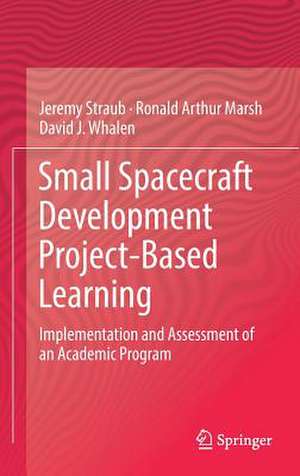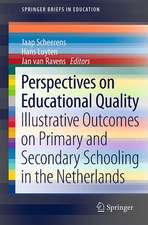Small Spacecraft Development Project-Based Learning: Implementation and Assessment of an Academic Program
Autor Jeremy Straub, Ronald Arthur Marsh, David J. Whalenen Limba Engleză Hardback – 20 feb 2017
| Toate formatele și edițiile | Preț | Express |
|---|---|---|
| Paperback (1) | 385.08 lei 6-8 săpt. | |
| Springer International Publishing – 9 iun 2018 | 385.08 lei 6-8 săpt. | |
| Hardback (1) | 392.37 lei 6-8 săpt. | |
| Springer International Publishing – 20 feb 2017 | 392.37 lei 6-8 săpt. |
Preț: 392.37 lei
Nou
Puncte Express: 589
Preț estimativ în valută:
75.10€ • 81.61$ • 63.13£
75.10€ • 81.61$ • 63.13£
Carte tipărită la comandă
Livrare economică 21 aprilie-05 mai
Preluare comenzi: 021 569.72.76
Specificații
ISBN-13: 9783319236445
ISBN-10: 331923644X
Pagini: 300
Ilustrații: XII, 231 p. 67 illus., 62 illus. in color.
Dimensiuni: 155 x 235 x 14 mm
Greutate: 0.52 kg
Ediția:1st ed. 2017
Editura: Springer International Publishing
Colecția Springer
Locul publicării:Cham, Switzerland
ISBN-10: 331923644X
Pagini: 300
Ilustrații: XII, 231 p. 67 illus., 62 illus. in color.
Dimensiuni: 155 x 235 x 14 mm
Greutate: 0.52 kg
Ediția:1st ed. 2017
Editura: Springer International Publishing
Colecția Springer
Locul publicării:Cham, Switzerland
Public țintă
ResearchCuprins
1.Introduction.- 2.Why start a small spacecraft program?.- 3.To build, to buy, or in between?.- 4.Starting a small spacecraft program: types of programs and their benefits and drawbacks.- 5.Forming a program - funding and organizational issues.- 6.Forming a program: funding and organizational issues.- 7.Forming a program: technical and logistical issues.- 8.Setting educational goals and formative assessment.- 9.Summative assessment.- 10.Results of prior assessment work and its utility.
Notă biografică
Jeremy Straub is an assistant professor in the Department of Computer Science at the North Dakota State University. Ronald Arthur Marsh is an associate professor and chair of the Computer Science Department at University of North Dakota. David J. Whalen has recently retired from being an associate professor at the John D. Odegard School of Aerospace Sciences in the Space Studies Department at the University of North Dakota.
Textul de pe ultima copertă
This book provides the information that is required to start a small spacecraft program for educational purposes. This will include a discussion of multiple approaches to program formation and build / buy / hybrid decision considerations. The book also discusses how a CubeSat (or other small spacecraft program) can be integrated into course and/or program curriculum and the ancillary benefits that such a program can provide. The assessment of small spacecraft programs and participatory project-based learning programs is also discussed extensively. The book presents prior work related to program assessment (both for a single program and internationally) and discusses how similar techniques can be utilized for both formative and summative assessment of a new program. The utility of these metrics (and past assessment of other programs) in gaining buy-in for program formation and funding is also considered.
Caracteristici
Provides an assessment of a small spacecraft program, an emerging topic in CubeSat programs Discusses program formation and initial decisions as a 'how-to' manual for starting a small spacecraft program Provides techniques and materials for assessing a new program and discusses how to use prior assessment to aid in securing buy-in for program formation and funding Includes supplementary material: sn.pub/extras










